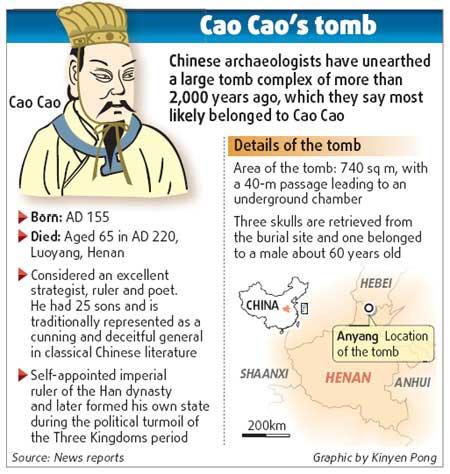Tomb of legendary general Cao Cao unearthed in central China
2009-12-28 10:44 BJT
BEIJING, Dec. 27 (Xinhua) -- The tomb of Cao Cao, a renowned warlord and politician in the third century, was unearthed in Anyang City of central China's Henan Province, archaeologists said Sunday.
 |
| Cao Cao (155-220 A.D.), who built the strongest and most prosperous state during the Three Kingdom period (208-280 A.D.), is remembered for his outstanding military and political talents. |
Cao Cao is also known for his poems that reflected his strong character. Some of the poems are included in China's middle school textbooks.
Three ancient corpses, one man and two women, were found in the two-chamber tomb in Xigaoxue village of Anyang. The man was found to have died in his sixties, which coincides the age of Cao Cao when he died, Liu Qingzhu, director of the academic committee of Chinese Academy of Social Sciences, told a press conference in Beijing.
More than 250 articles, made of gold, silver, pottery and etc, were unearthed from the 740-square-meter tomb, a size appropriate for a king. Archaeologists also found 59 engraved stone plates logging the name and amount of the articles buried in the tomb. Seven of the plates logged weapons "often used by the king of Wei", or Cao Cao, Liu said.
Also unearthed were a large amount of paintings drawn on stone plates, Liu added.
Cao Cao wrote in his will that his burial place should be simple, which corresponds to the fact that the walls of the tome were not painted and few precious articles were found, said Hao Benxing, head of Henan's Institute of Archaeology.
The position of the tomb is in line with historical recordings and ancient books from Cao Cao's time, Hao added.
Although further excavations are yet to be carried out, current evidences are adequate to prove this is Cao Cao's tomb, said Guan Qiang, director of the archaeology department of China's State Administration of Cultural Heritage.
The tomb had been raided for several times before archaeologists started to excavate it in Dec. 2008, Guan said.
The police are working to retrieve the stolen articles, he added.
The governments of Henan and Anyang are planning to display the tomb to the public, Hao said.

 Mail
Mail Share
Share Print
Print


 Video
Video









 2009 China Central Television. All Rights Reserved
2009 China Central Television. All Rights Reserved